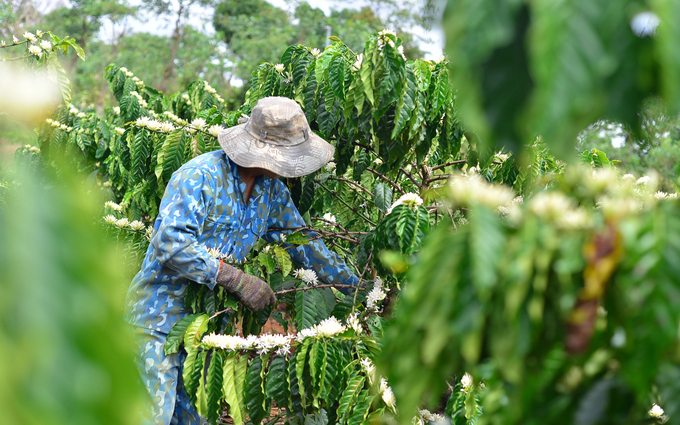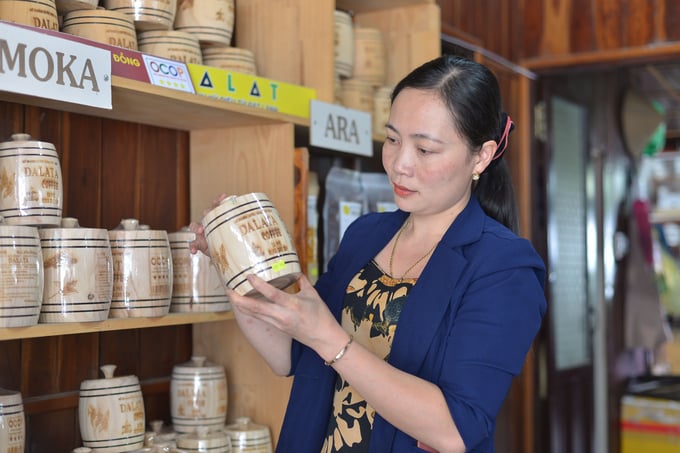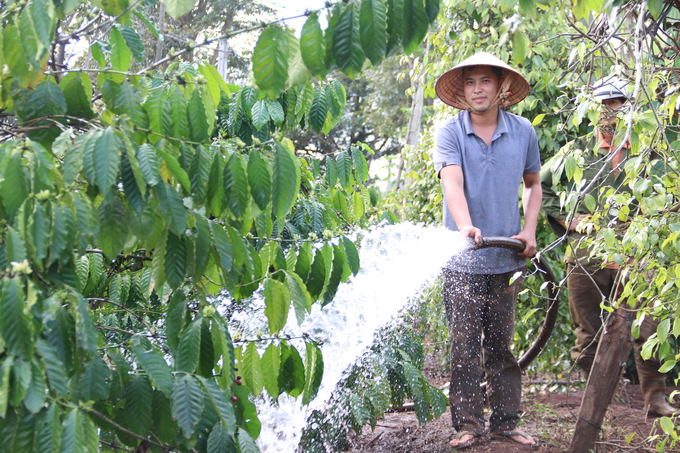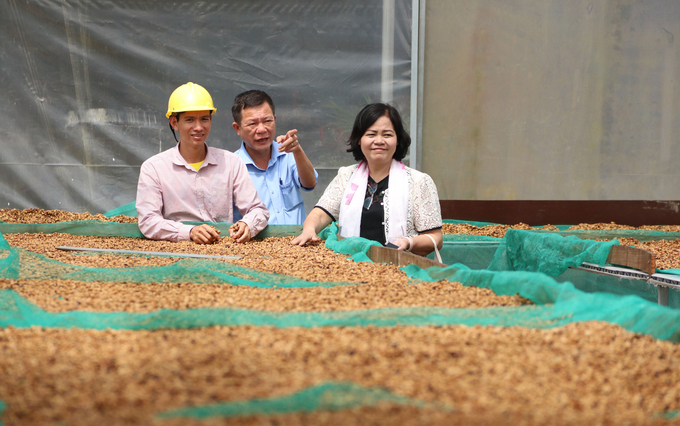May 21, 2025 | 07:56 GMT +7
May 21, 2025 | 07:56 GMT +7
Hotline: 0913.378.918
May 21, 2025 | 07:56 GMT +7
Hotline: 0913.378.918
According to Lam Dong Department of Agriculture and Rural Development, the local coffee area currently ranks second in the country (after Dak Lak) with approximately 176,000 ha. Robusta coffee accounts for nearly 159,000 ha. Arabic coffee 16,700 ha, and Liberian coffee 200 ha. Coffee is mostly grown in Di Linh district (approximately 45,600 ha). Lam Dong’s average coffee yield is 3.55 tons/ha, resulting in a total annual output of over 600,000 tons.
Lam Dong’s coffee products including roasted coffee or ground coffee are exported to markets such as Germany, Spain, Belgium, Italy, Taiwan, Korea, Japan, Indonesia, etc. In 2022, the province's export of green coffee will be over 90,000 tons with a value of over $180 million," said Mr. Ha Ngoc Chien.

Lam Dong’s coffee area currently ranks second in Vietnam, after Dak Lak. Photo: Minh Hau.
This province is implementing solutions that concern planning to complete the mechanism and specific policies of the province in supporting the production of specialty coffee. Lam Dong aims to further apply information technology in monitoring and managing specialty coffee growing areas to ensure traceability, information retrieval and food safety.
In order to improve the quality and value of coffee products and thus meet the requirements of domestic and foreign markets, the agricultural sector of Lam Dong will expand the area of specialty coffee in qualified regions. The province also encourages people, businesses and cooperatives to build and develop the province's specialty coffee brands and support enterprises in the province to build their own brands. Lam Dong Department of Agriculture and Rural Development provides daily coffee market news for producers to grasp the situation and come up with effective and sustainable production strategies.

Lam Dong focuses on developing specialty coffee, OCOP coffee. Photo: Minh Hau.
This year, Lam Dong will continue to build and replicate models. It is expected that approximately 10 ha will be certified in the near future. Along with supporting farmers, cooperatives and businesses to build a model of organic coffee according to Vietnamese standards, the agricultural sector of Lam Dong province also encourages people and businesses to practice safe coffee production in the organic direction to improve the quality and value of this agricultural product.
As for Dak Lak, this province has 213,000 ha of coffee with an annual output of 558,000 tons, currently the largest coffee production in the country. Up to now, Dak Lak coffee has been exported to more than 80 markets around the world, reaching a turnover of nearly USD 900 million, accounting for over 55% of the province's export turnover. Coffee production in Dak Lak has created stable jobs for more than 300,000 direct producers and nearly 200,000 related personnel.
Statistics from Dak Lak Department of Agriculture and Rural Development show that the local coffee farming model still consists of farming households with a rate of 85%, the rest is managed by companies and cooperatives that have established specialized coffee growing areas. Approximately 20% of households produce UTZ, RA, FLO certified coffee and specialty coffee, with an area of nearly 66,000 ha, accounting for over 30% of the area and an output of 223,000 tons, accounting for 40% of the province’s total coffee output.

Dak Lak has developed many projects and policies to help the coffee industry thrive. Photo: Quang Yen.
Vu Duc Con, Deputy Director of Dak Lak Department of Agriculture and Rural Development, said that in order for the local coffee industry to develop sustainably, the unit will continue to strengthen and promote the effectiveness of State management specifically planning and formulating economic development policies.
The localities will coordinate with local sectors to strengthen the inspection and recommend farmers not to expand the coffee area on unsuitable land, and instead focus on intensive farming in the direction of good agricultural practice (VietGAP) and step by step approach to 4C, UTZ certified coffee production programs. Units in the agriculture sector also review the area of specialized coffee growing areas to ensure the direction of sustainability and produce coffee with clear origin and brand.

Dak Lak’s goal is to develop sustainable coffee in consideration of farmers’ interests. Photo: Quang Yen.
Based on the actual situation and assigned tasks, departments, branches and local authorities need to be more drastic in coordinating and directing the implementation of the province’s ‘Project on sustainable coffee development by 2020, vision to 2030’. In addition, the industry should also focus on deploying effective applications of information technology, especially digital transformation in agriculture to best support and serve people and businesses," said Deputy Director Con.
Translated by Samuel Pham

(VAN) Japan's grant aid project contributes to capacity building, promoting organic agricultural production, and fostering sustainable community development in Dong Thap province.

(VAN) For years, the CRISPR-Cas9 genome technology has been reshaping genetic engineering, a precision tool to transform everything from agriculture to medicine.

(VAN) Vietnam aims to become a 'leader' in the region in the capacity and managing effectively soil health and crop nutrition.
![Reducing emissions from rice fields: [Part 1] Farming clean rice together](https://t.ex-cdn.com/nongnghiepmoitruong.vn/608w/files/news/2025/05/05/z6509661417740_a647202949c539012a959e841c03e1d3-nongnghiep-143611.jpg)
(VAN) Growing clean rice helps reduce environmental pollution while increasing income, allowing farmers to feel secure in production and remain committed to their fields for the long term.
/2025/05/19/5136-1-144800_230.jpg)
(VAN) The Nghe An Provincial People's Committee has just approved the list of beneficiaries eligible for revenue from the Emission Reductions Payment Agreement (ERPA) in the North Central region for the year 2025.

(VAN) 14 out of 35 domesticated elephants in Dak Lak province have had their living conditions improved, with 11 of them currently participating in the non-riding elephant tourism model.

(VAN) Muong Nhe Nature Reserve hopes that being upgraded to a national park will lay the foundation for forest protection efforts to be carried out in a systematic, modern, and sustainable manner.